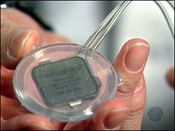VBLOC: Gastric bypass surgery alternative

New York, NY
There may be new hope for people struggling with obesity.
It's called VBLOC therapy and it works by stopping the impulse to overeat by blocking the vagal nerves. Those nerves communicate feelings of hunger and fullness from the brain to the stomach.
With the new approach, doctors insert a VBLOC device just beneath the skin. It's a receiver. Electrodes are hooked up to the vagal nerves. And the patient wears a belt that transmits electronic impulses to confuse or block the nerves' signals. The desired result - pangs of hunger are reduced, and patients eat less.
A nationwide trial of VBLOC therapy is under way.
The treatment is considered less invasive than bariatric surgeries, which usually involve shrinking the stomach by wrapping a tight band around it - a so-called lap-band - or bypassing large sections of the stomach altogether and going directly to the rest of the digestive tract - commonly referred to as gastric bypass surgery.
On "The Early Show" Friday, Dr. Scott Shikora, chief of bariatric surgery at Tufts University Medical Center in Boston and one of the current study's principal investigators, showed a VBLOC device, explained how it works, and outlined the new therapy's possible benefits.
And Jeff Collins, who had the device implanted in Los Angeles in December, said he's lost 20 pounds and now weighs 285. "I would recommend it to anybody who's (trying) to lose weight."
"The risk with the other two gastric bypass procedures right now is too high, especially with people my age," Collins said.
"With gastric bypass," Shikora pointed out to CBS News, "we're dividing the stomach and bowel, and it's fraught with potential risks, such as infection. With the VBLOC, we're not dividing the stomach, we're simply attaching electrodes to two very prominent nerves."
But, he cauutioned, "Remember: This is research. We don't know yet how this device will perform, how consistent it will be long-term. It could prove to be a better alternative for some. Also, gastric bypass has a 40-year track record. We know it works."
Shikora says it takes 45 minutes to an hour to implant the device and patients can often go home the same day. More >>

0 Comments:
Post a Comment
<< Home